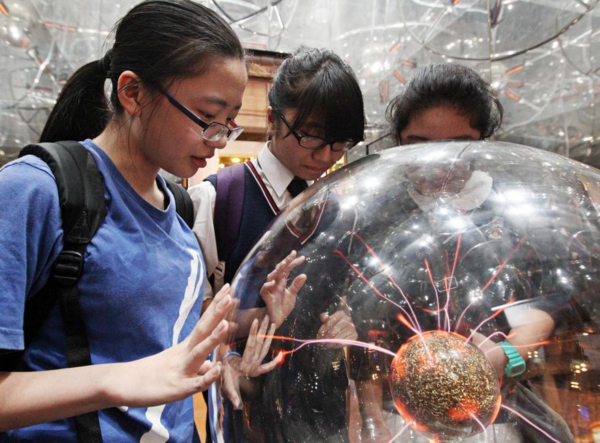
Getting your children interested in science from an early age is a very important factor these days, who knows your child might be the next Einstein! When children are taught about science in school it often means that they see it as a boring subject that they only need to do in school, whereas in truth it’s an extremely interesting topic and creating an interest at an early age means they’re more likely to go on to study it in later life! Having an interest in science also means that when they’re being taught in school they can apply their knowledge to real life situations, making it easier to comprehend when it comes to revision and exams. There are a number of things you can do to spur this interest on, ranging from doing experiments at home to taking them to science museums, you can do as little or as much as you like!
Science at Home
There’s an awful lot of science in the home that your children don’t realise, and you can easily teach them about simple things such as solids, liquids and gases and gravity in fun and interesting ways in the comfort of your own home! For example, take a block of ice. To most young children they see it as a way to keep food cool and to put in your drinks but don’t think about the science behind it, but what about when the ice melts? Leaving a block of ice out in the sun until it’s fully melted is a great way to explain the changing states to your children, and showing them the change from liquid to gas is also just as easy. You can either boil a kettle or put water in a pan and heat it to boiling point and explain to your child the change from liquid to gas!
There are a number of fun ways to teach about gravity too, for example investing in a trampoline from a warehouse such as best trampolines Australia and then using them jumping up and down to explain gravity is fun for your children, plus there’s no reason you can’t join in with the fun! Another example is throwing a football and letting it fall to the ground, then explaining why it does! If you’re not opposed to a little mess you can also do this with eggs, this will be a firm favourite with children when they see them smash!
Visit a Science Museum
This is definitely one of the coolest options for getting your child interested in science, as there are always demonstrations to see and experiments that they can do themselves to get some hands-on learning! You can find your nearest science museum online and plan a trip out for the day, which can also be an excellent way to spend time with your family and bond. There are often a range of exhibitions on at different times that you can visit with your child and they can often join in with the demonstrations adding that extra bit of excitement to their day. The great thing about visiting a museum is that there’s something for everyone there so parent’s also won’t get bored during their day!
Invest in a Chemistry Kit!
Nothing is more appealing to a 10 year old boy than exploding things, so a chemistry kit is going to be a sure winner for a present! These kits often come with a number of experiments for your children to try at home that can create a strong interest in science whilst having fun. However, these kits can often be expensive so if you don’t want to buy one, then don’t worry, there are plenty of experiments you can do at home using products from your own cupboards! For example, add some baking powder, laundry detergent to a see through glass with some food colouring, and then quickly add vinegar to see a ridiculous amount of foam form! You can also fill a bottle full of soda, and add a handful of raisins to watch them dance. Leave the mixture for a few minutes and ask your children to describe what they can see for a great experiment with an air of magic to it!
If your child doesn’t seem particularly interested in science, or isn’t enjoying it at school be sure to try a few of these tricks to see if you can’t get them more involved in the subject!
This article was written by Sarah Hickens for Trampoline Warehouse. Trampoline Warehouse is your one stop shop for the best trampolines Australia related. Sarah is an avid science enthusiast and enjoys writing about it for the various blogs that she writes for.










Comments